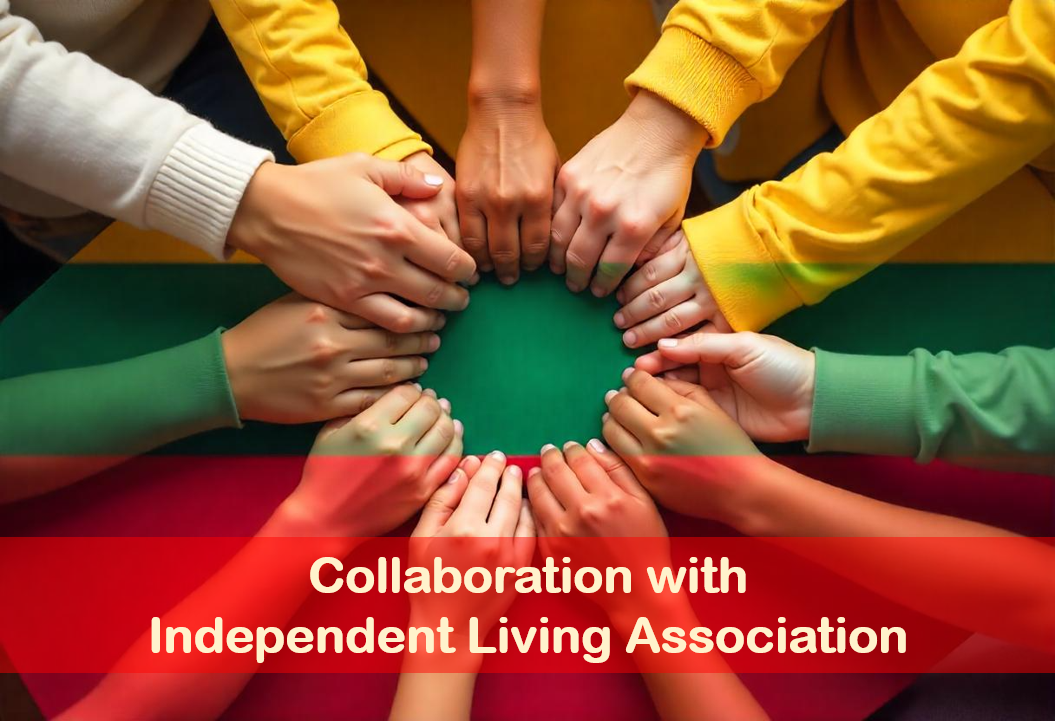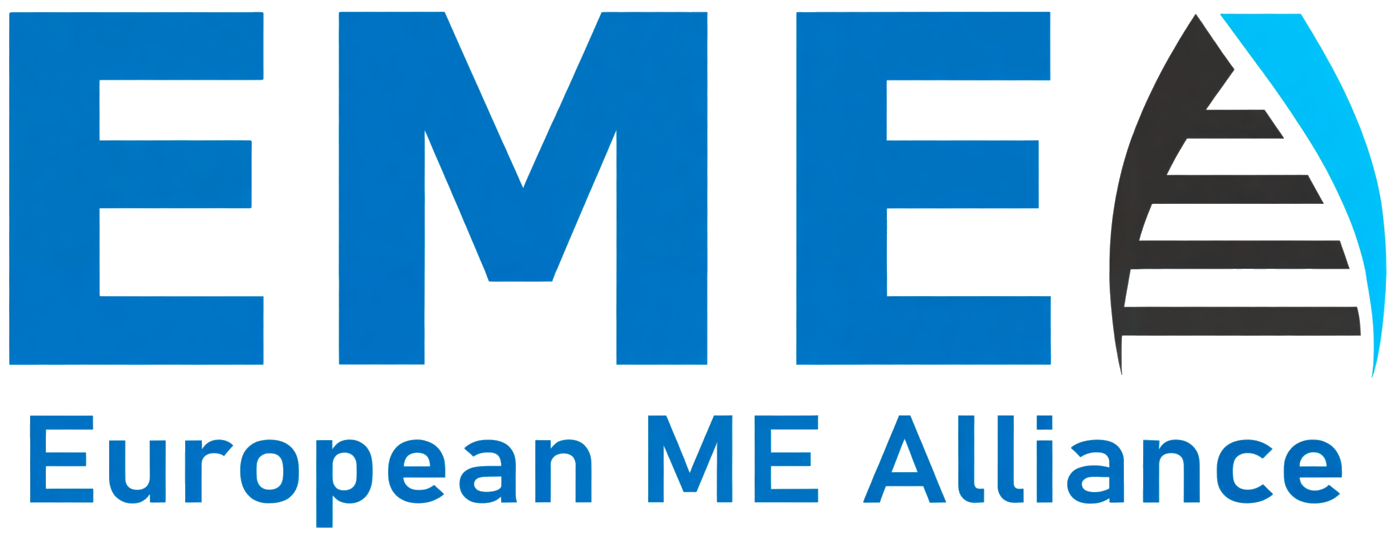
EMEA Lithuania News
EMEA meets with its Lithuanian Member Independent Living Association
Whilst participating in the recent European Disability Forum (EDF) Annual Meeting in Vilnius, Lithuania, on 21–22 June 2025,
EMEA met with the President and a Board Member of the Independent Living Association, an EMEA member society.
The discussion focused on the longstanding neglect of people with severe disability due to myalgic encephalomyelitis,
referred to as ME/CFS in Lithuania.
It was noted that attempts have been made for several years now to examine further actions that could reduce the suspected systemic abuse
and discrimination against those with ME/CFS in Lithuania.
The discussion covered ongoing support and explored further actions to improve recognition and support for ME patients in Lithuania.
EMEA provided:
- A Lithuanian-language summary of the Renovabis project, which sought funding for research into ME in Lithuania more details here . It required support from Lithuanian church authorities but this was denied.
- The 2020 European Parliament Resolution on ME, in Lithuanian, which details the estimated numbers of people affected.
- A summary report of EMEA’s survey of 11,000 patients, also in Lithuanian.
It was agreed that Independent Living would draft a letter to the Minister of Social Affairs and the Ministry of Health, with input from EMEA, to advocate for ME patients. There are also plans to prepare a report documenting the legal and structural barriers faced by ME patients in Lithuania who, despite their severely disabling symptoms, are not treated accordingly.
Current Situation for ME in Lithuania
- Recognition: ME has been classified as a physical neurological illness by the World Health Organization since 1969. However, in Lithuania, there is a lack of support and recognition for those with severe disability due to ME.
- Assumptions about Support: There is a widespread and false belief that humanitarian organisations are providing adequate support, which has led to a lack of action from public authorities.
- Awareness: In Lithuania, initiatives for training for health professionals and public authorities have not yet been implemented, and most officials remain unaware of ME.
- Stigma: Many ME patients do not receive social or welfare benefits and may face administrative penalties and stigma due to misconceptions about their illness.
- Medical Support: There are currently no recognised specialists in Lithuania with expertise in ME, and no diagnostic biomarkers exist. Patients are often told they are healthy and able to work, despite debilitating symptoms - or prescribed potentially harmful psychiatric treatments..
The Lithuanian Renovabis Project

In 2024, the Lithuanian Association 'Independent Living' submitted a project to the German charitable organisation ‘Renovabis’, which was
supported by EMEA.
The project application sought to obtain funding to investigate the ME/CFS situation in Lithuania, but it required support from Lithuanian
church authorities which was denied.
1. ME/CFS has been recognised as a physical neurological illness by the WHO since 1969. People afflicted with this disease suffer from physical symptoms that can make it impossible to perform basic everyday activities. Although the official diagnosis of ME/CFS in many EU countries affirms that patients can talk, walk or even work, there are many who cannot. In Lithuania, there is no one providing support to this vulnerable group of people with severe levels of disability.
2. Lithuanians and Lithuanian institutions generally have a strong false belief that some humanitarian organisations (like the Order of Malta or Caritas) are already caring for this vulnerable population in crisis. Because of this belief, Lithuanians see little cause for concern in refusing sufferers’ requests for assistance and telling them to be satisfied with the help that is supposedly available from humanitarian organisations until the European Commission finds solutions.
3. The European Parliament voted for EU resolution on additional funding for ME/CFS (2020/2580(RSP)). Under 15 & Q it states: “the European Parliament invites the Commission and the Member States to launch information and awareness-raising campaigns among health professionals and the public in order to alert the population to the existence and symptoms of ME/CFS” and "specifically targeted training should be provided to raise awareness among public authorities, healthcare providers and officials in general". There i s no one promoting achieving these important goals in Lithuania and most Lithuanian public authorities and officials are not aware of ME/CFS, and believe they need to battle against these people, despite their severe disability, because they believe they are malingering and pretending to be ill in order not to have to work.
4. Lithuanians commonly agree that ME/CFS sufferers must passively wait while the European Commission works to find solutions, because some Lithuanians oppose the EU resolution on ME/CFS, and have a strong opinion that ME/CFS is an illness invented by Western countries, like transgenderism, and so it should not be taken seriously, despite a large number of scientific publications documenting its existence and symptoms.
5. The Order of Malta, Caritas and other humanitarian organisations have been contacted on behalf of ME/CFS sufferers but until now they have not indicated that they intend to provide concrete assistance and have responded saying that they have no competence or way to verify if such sufferers are disabled, needy, or malingering. This is why they too say ME/CFS sufferers should wait for competent officials to act first. However, even the competent Lithuanian officials have no awareness of ME/CFS and the needs of sufferers. Everyday Lithuanians and the Lithuanian public authorities see no urge in acting since they generally believe that humanitarian organisations (like the Order of Malta, Caritas, etc.) will care for ME/CFS sufferers if they have a severe disability, and thus the vicious cycle of longstanding negligence towards these helpless and vulnerable population continues.
6. The European ME Alliance notes that the average ME/CFS prevalence rate is 0.2-0.4% of a country’s population. After being affected by this neurological disease, many young and previously healthy people, find themselves unable to work and housebound and bedbound for years or decades. However, because ME/CFS sufferers are believed to be physically healthy and malingering, they do not receive social or welfare benefits, which often pushes them and their families into poverty. They receive administrative penalties and subsequently stigmatisation because they haven’t changed their behaviour even when facing penalties, but rather did nothing to counteract their impoverishment, expropriation or dismissal.
7. Many Lithuanians of all professions and walks of life are inadvertently harming ME/CFS sufferers due to a lack of knowledge and education. Our organisation knows of patients who are reporting to us symptoms, lack of diagnosis, and that patients are verbally abused and denied assistance. In Lithuania there are no possibilities to clarify and address the claims of the ME/CFS sufferers in order to avoid unintentional harm to them. Even patient organisations, patient rights institutions, disability rights commissions, lawyers and mediators do not believe that they will succeed if they stand up for and defend ME/CFS sufferers, because in Lithuania according to national and international law the sufferers are considered healthy.
8. Despite the fact that there is no basis for social justice under national law, it is still very necessary for a country with Christian values to analyze our moral and ethical duty following the teachings of the Gospels and the Social Teaching of the Church. Currently, no one is investigating the abnormal cultural development towards the stigmatisation of ME/CFS sufferers and the violence against them, which has changed Christian norms, defining the disease solely based on scientific biological markers, for which none yet exist for this disease, and therefore these patients are ignored and not cared for in Lithuania.
9. There is no information in the Lithuanian language to raise awareness about ME/CFS to help people avoid remorse when they realise they have sinned and violated the biblical principles when they denied help to those who were actually sick and suffering from a severely disabling disease.
10. Those Lithuanian Christians who support the moral values and The Social Teaching of the Church do not know whether they should believe ME/CFS sufferers, and they do not know how to act in this situation where there is no intervention of the state to meet the basic needs of ME/CFS patients and stop the systematic violence against them. This is also because there is the common opinion, that no one but doctors can help ME/CFS sufferers. However, there is no official knowledge that in Lithuania there is a doctor who has the competence to diagnose ME/CFS. Furthermore, there are no diagnostic biomarkers, and doctors tell sick patients that they are healthy and able to work despite debilitating symptoms. Everyday people are told that it is all in the patient’s head and patients only ‘think’ they are severely disabled and therefore should not be helped or they will never get better. This is an outdated and false belief, because many ME/CFS specialists have already documented that refusing help to ME/CFS sufferers worsens symptoms, leaving them less able, or completely unable, to care for themselves once they overexert themselves by performing even minimal tasks. Lithuanian ME/CFS sufferers remain disoriented, not knowing why society refuses to help curb the violence and stigmatisation directed against them. They are waiting for someone to explain to them the requirements that would allow them to survive and for people to believe them. ME/CFS sufferers need to know how much and what kind of evidence they need to provide for their condition, for which a medical biomarker does not yet exist, so that not only on the basis of a clinical diagnosis but also on the basis of other evidence they could prove they are ill and in need of assistance.
Article in 'Laikmetis'
As a result of the meeting, the President of the Lithuanian Association Independent Living
published an article on ME in Lithuanian
in the Christian portal "Laikmetis".
The article
is here -
and a translation
is
available here.





